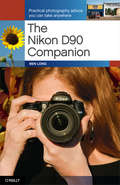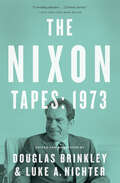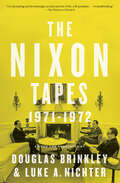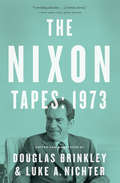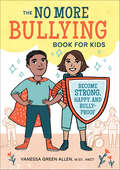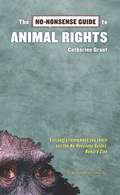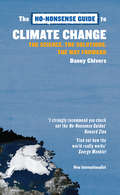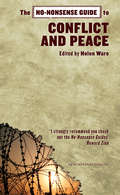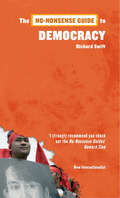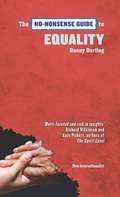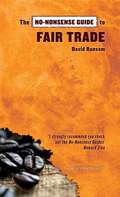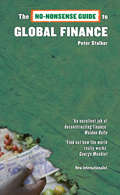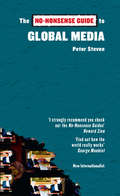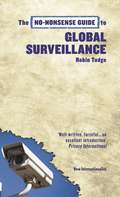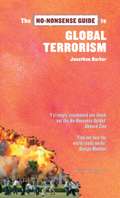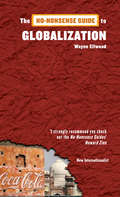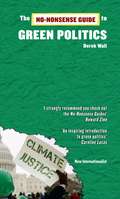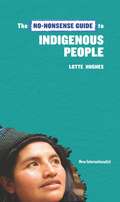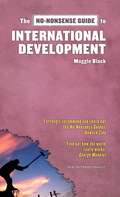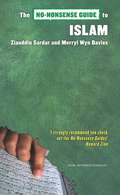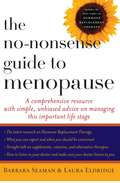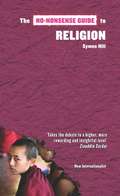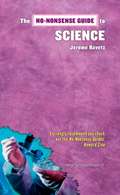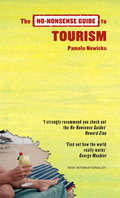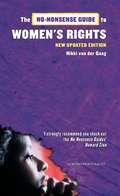- Table View
- List View
The Nikon D90 Companion: Practical Photography Advice You Can Take Anywhere
by Ben LongThrough easy-to-follow lessons, this handy book offers a complete class on digital photography, tailored specifically for people who use the Nikon D90. This is not your typical camera guide: rather than just show you what all the buttons do, it teaches you how to use the D90's features to make great photographs-including professional-looking images of people, landscapes, action shots, close-ups, night shots, HD video, and more. With Ben Long's creative tips and technical advice, you have the perfect, camera-bag-friendly reference that will help you capture stunning pictures anywhere, anytime. The Nikon D90 Companion will show you how to: Take creative control and go beyond automatic settings Learn the basic rules of composition Capture decisive moments, including fast-moving objects Discover ways to use a flash indoors and outdoors Learn about different lenses, and the best time to use them Understand the options for shooting RAW, and whether it's right for you Use the D90's ability to shoot high definition video
The Nixon Tapes (With Audio Clips): 1973 (WITH AUDIO CLIPS)
by Douglas Brinkley, Luke A. NichterWith audio clips included, this &“revealing&” transcription captures a dark and dramatic year in presidential history—and the words of Richard Nixon himself (The New York Times Book Review). Between 1971 and 1973, President Richard Nixon&’s voice-activated tape recorders captured 3,700 hours of conversations. Douglas Brinkley and Luke Nichter&’s intrepid two-volume transcription and annotation of the highlights of this essential archive provides an unprecedented and fascinating window into the inner workings of a momentous presidency. The Nixon Tapes: 1973 tells the concluding chapter of the story, the final year of taping, covering such events as the Vietnam cease-fire, the Wounded Knee standoff, and, of course, the Watergate investigation. Once again, there are revelations on every page. With Nixon&’s landslide 1972 reelection victory receding into the background and the scandal that would scuttle the administration looming, The Nixon Tapes: 1973 reveals the inside story of the tragedy that followed the triumph.
The Nixon Tapes: 1971–1972 (With Audio Clips)
by Douglas Brinkley, Luke A. NichterAn enhanced edition of this &“fascinating&” collection of White House transcripts, including audio clips of some of the most newsworthy conversations (San Francisco Chronicle). This &“treasure trove&” of transcripts documents two years of Richard Nixon&’s presidency and takes you directly inside the White House, through the famous—and infamous—Nixon White House tapes that reveal for the first time the president uncensored, unfiltered, and in his own words (TheBoston Globe). President Nixon&’s voice-activated taping system captured every word spoken in the Oval Office, Cabinet Room, other key locations in the White House, and at Camp David—3,700 hours of recordings between 1971 and 1973. Yet less than five percent of those conversations have ever been transcribed and published. Now, thanks to historian Luke Nichter&’s massive effort to digitize and transcribe the tapes, the world can finally read an unprecedented account of one of the most important and controversial presidencies in US history. This volume of The Nixon Tapes offers a selection of fascinating scenes from the period in which Nixon opened relations with China, negotiated the SALT I arms agreement with the Soviet Union, and won a landslide reelection victory. All the while, the growing shadow of Watergate and Nixon&’s political downfall crept ever closer. The Nixon Tapes provides a never-before-seen glimpse into a flawed president&’s hubris, paranoia, and political genius—&“essential for students of the era and fascinating for those who lived it&” (Kirkus Reviews, starred review).
The Nixon Tapes: 1973
by Douglas Brinkley, Luke A. NichterThis &“revealing&” transcription captures a dark and dramatic year in presidential history—and the words of Richard Nixon himself (The New York Times Book Review). Between 1971 and 1973, President Richard Nixon&’s voice-activated tape recorders captured 3,700 hours of conversations. Douglas Brinkley and Luke Nichter&’s intrepid two-volume transcription and annotation of the highlights of this essential archive provides an unprecedented and fascinating window into the inner workings of a momentous presidency. The Nixon Tapes: 1973 tells the concluding chapter of the story, the final year of taping, covering such events as the Vietnam cease-fire, the Wounded Knee standoff, and, of course, the Watergate investigation. Once again, there are revelations on every page. With Nixon&’s landslide 1972 reelection victory receding into the background and the scandal that would scuttle the administration looming, The Nixon Tapes: 1973 reveals the inside story of the tragedy that followed the triumph.
The No More Bullying Book for Kids: Become Strong, Happy, and Bully-Proof
by Vanessa Green AllenHelp kids ages 8 to 12 build the skills and resilience to confidently handle bullyingBullying has become a common problem for kids. Yet, many may not know what bullying actually is or what to do if it happens to them. The No More Bullying Book for Kids gives kids the information they need to identify bullying, followed by strategies for dealing with specific situations when they or someone they know is being bullied.The No-More Bullying Book for Kids addresses the various forms of bullying that occur in today's world and includes:An overview of bullying to help kids understand what bullying is, possible reasons why people bully others, and the different types of bullying—physical, verbal, emotional, and cyberPractical tips for specific words and actions kids can use to deal with bullies, as well as advice for getting help from others when they need itStrategies for becoming "bully proof" which focus on helping kids build the resilience to bounce back from bullyingReal-world examples and anecdotes that illustrate a variety of real-life bullying instances and encourage kids to practice making judgment callsWritten by professional school counselor Vanessa Green Allen, The No-More Bullying Book for Kids puts the power back in kids hands with tools that will give them confidence in the face of bullying and help them feel really good about who they are—which is all that actually matters.
The No-Nonsense Guide to Animal Rights
by Catharine GrantToday animals need protecting more than ever: those bred for laboratories, zoos, and hunting, and also those reared intensively on farms. And out in the wild, animals are losing their habitats to environmental exploitation.<P><P>Dispelling the myth that the protection of animals' rights is a modern, Western concern, this No-Nonsense Guide to Animal Rights explains the key issues, charts the growth of the animal rights movement, and looks at the welfare and protection laws. And it includes a practical day-to-day guide to what individuals can do to minimize exploitation.
The No-Nonsense Guide to Climate Change
by Danny ChiversJust as the need for action on climate change becomes more urgent and overwhelming, the campaign to deny that humans are causing it has gained more traction. This completely new book meets the sceptics head on, offering a guide to the science, an insight into the politics of climate justice and a clear sense of the way forward.
The No-Nonsense Guide to Conflict and Peace
by Sabina Lautensach Helen Ware Deanna Iribarnegaray Peter GreenerThe twentieth century was the most bloody in history, and already conflict in this century has taken a heavy toll. Most wars are now within countries rather than between states, and often it is civilians that suffer most, especially women and children.This is an invaluable guide for students, peace groups, and activists. It examines the changing types of war, including the war on terror and ethnic conflict such as in Rwanda, the role of diplomacy and the UN, and what steps ordinary people are taking to rebuild communities. It offers ideas and inspiration for creating lasting peace.
The No-Nonsense Guide to Democracy
by Richard SwiftFollowing the economic meltdown and the triumph of Barack Obama, have the chances of genuine democracy improved?In this updated edition of The No-Nonsense Guide to Democracy, Richard Swift explores how democracy has been constricted and deformed by economic power brokers and a self-serving political class from Birmingham to Bangalore. He considers the different tools people in power have used to manipulate democratic principles, such as freedom, to their advantage.The book includes chapter-length discussions of topics such as the economic meltdown, Barack Obama, eco-democracy, democratizing the economy, and democracy in the global south. It is also a guide to the rich diversity of forms of elected government, and it contains practical ideas for empowering today's voters around the world.Richard Swift was co-editor for the New Internationalist magazine from 1984 to 2007 and lives in Toronto. He has written and broadcast on questions of ecology and democracy for many years.
The No-Nonsense Guide to Equality
by Kate Pickett Richard Wilkinson Danny DorlingThe No-Nonsense Guide to Equality discusses the positive effects that equality can have, using examples and case studies from across the globe, including many from the United States. It examines the lessons of history and covers race, gender and ethnicity, age, and wealth. Danny Dorling considers, realistically, just how equal it is possible to be, the challenges we face, and the factors that will lead to greater equality for all.Danny Dorling is professor of human geography at the University of Sheffield, United Kingdom, and one of the leading international experts on inequality. He has written extensively about the widening gap between rich and poor and his work regularly appears in the Guardian. He is author of several books, including Injustice: Why Social Inequality Persists and The Atlas of the Real World.
The No-Nonsense Guide to Fair Trade
by David RansomMeeting the people who grow our bananas and cocoa and make our clothes, this No-Nonsense Guide to Fair Trade tells the human story behind what we consume. <P><P>Examin-ing the global contest between "free" and "fair" trade, David Ransom argues that the key question is not whether trade should be regulated or deregulated, but whether it is to be the master or servant of the people.And as fair trade products are being turned into brands by large corporations, a new contest opens-it is no longer just a question of fair versus free, but what kind of fair trade.
The No-Nonsense Guide to Global Finance
by Peter StalkerAn incisive introduction to global finance--where money comes from, the current mechanisms, and the need for control and reform. It traces the origins of money as a source of exchange and a store of value and the many weird forms it now takes--visible and invisible.The guide sets recent events into context, indicating how the flows of money directed by an unaccountable elite increasingly shape economic, political, and social activity.Peter Stalker is a former co-editor of the New Internationalist who now works as a consultant to a number of UN agencies. He is author of the No-Nonsense Guide to International Migration.
The No-Nonsense Guide to Global Media
by Peter StevenPeter Steven explores the diversity of world media, from the corporate to the independent. He introduces readers to the political economy of the major media outlets, looking at the concentration of ownership and the convergence of technologies and media functions. In doing so, he encourages us to question how the media reflects society: are we passive recipients, or do we have a part in constructing the world?Peter Steven is a freelance writer based in Toronto, Canada. He has been a film columnist for New Internationalist and The Beaver magazines, and associate editor of Jump Cut magazine.
The No-Nonsense Guide to Global Surveillance
by Robin TudgeSpying, once the province of the KGB, CIA and MI5, has become part of everyday life. Governments routinely trawl our emails, CCTV cameras follow us on every street, while state databases of our DNA become larger all the time. This book shows the extent to which Big Brother is watching us all.
The No-Nonsense Guide to Global Terrorism
by Jonathan BarkerThis is a highly accessible history of terrorism that looks at core examples from the Middle East, instances of state terrorism, and terrorist fringes of political movements. It covers the theories justifying and guiding terrorist acts and the battle of images that accompanies them.Jonathan Barker has taught political science at the universities of Toronto, Arizona, and Dar es Salam. He has researched local politics in Senegal, Tanzania, Uganda, and India. His other books include Street-Level Democracy and Rural Communities under Stress.
The No-Nonsense Guide to Globalization
by Wayne EllwoodGlobalization is all around us. From the richest country to the poorest, every aspect of life is affected by global economics and communications. We all benefit...or do we?This No-Nonsense Guide to Globalization distills the arguments into a clear, concise commentary. It examines the debt trap, the acceleration of neo-liberalism and the "free trade" model, competition for energy resources, and the links between the war on terror, the arms trade, and privatization. It looks at civil society alternatives to corporate globalization and the latest trade justice initiatives.
The No-Nonsense Guide to Green Politics
by Derek WallClimate chaos and pollution, deforestation and consumerism: the crisis facing human civilization is clear enough. But the response of politicians to it has been cowardly and inadequate, while environmental activists have tended to favor single-issue campaigns rather than electoral politics.The No-Nonsense Guide to Green Politics measures the rising tide of eco-activism and awareness and explains why it heralds a new political era worldwide.Derek Wall is a former principal speaker of the British Green Party. He is the author of numerous books, including Babylon and Beyond: The Economics of Anti-Capitalist, Anti-Globalist and Radical Green Movements.
The No-Nonsense Guide to Indigenous People
by Lotte HughesThis guide looks beyond the exotic images tracing the story of different indigenous people from their first contact with explorers and colonizers to the present day. Much of this story is told by the indigenous people themselves and they present the issues behind the challenge to give them their own space in their own lands.
The No-Nonsense Guide to International Development
by Maggie Black"Overseas aid" and "international development" are catch-all terms that cover a multitude of activities--and abuses. This guide explains what "development" actually is--and explores its political and economic roots. It shows what can happen in the name of development and argues for a more organic, social approach with those it seeks to serve as equal partners in the process. Maggie Black has written books for the Oxford University Press, UNICEF, and Oxfam. She has worked as a consultant for UNICEF, Anti-Slavery International, and WaterAid, among others, and has written for the Guardian, The Economist, and BBC World Service.
The No-Nonsense Guide to Islam
by Ziauddin Sardar Merryl Wyn DaviesThis guide explains Islamic history, the Qur'an, sharia law, and Islam's relationship with the West. It analyzes the struggle within the faith for a more humane interpretation of the religion, issues surrounding women, democracy, and economic development, and the outlook post-9/11 and the Iraq war. Merryl Wyn Davies is a writer, anthropologist, and TV producer. The author of Knowing One Another: Shaping an Islamic Anthropology, she also co-authored the international bestseller Why Do People Hate America? Ziauddin Sardar is a writer, broadcaster, and cultural critic. His works include Postmodernism and the Other, Orientalism, and Why Do People Hate America?, written with Merryl Wyn Davies.
The No-Nonsense Guide to Menopause
by Barbara Seaman Laura EldridgeFor nearly as long as women have been around, they have been going through menopause. It is a bodily process as old as human birth, death, and of course, menstruation. Like many normal biological events, menopause was gradually medicalized, and with the rise of pharmaceutical medicine, women and their doctors were convinced that it was an "estrogen deficiency disease" that could be treated by supplementing the body's declining estrogen levels with hormones. By 2002 hormone treatment had been on the market for more than fifty years when doctors and women alike were shocked by the results of a massive clinical trial, the Women's Health Initiative: women taking hormones had more heart attacks, breast cancer, strokes, pulmonary embolisms, and blood clots than women who did not, and patients were left scrambling to find new and sometimes difficult answers to their menopause and midlife health questions. In The No-Nonsense Guide to Menopause, Barbara Seaman, a legendary figure in the women's health movement, and Laura Eldridge have written a comprehensive, easy-to-use resource that will give you all the information you need to make smart and informed decisions that will put you in control during this time of transition -- medically, psychologically, sexually, and even financially. With the latest research on everything from hormone replacement therapy to skin creams to preventing osteoporosis, The No-Nonsense Guide to Menopause is the definitive manual on this important subject. You'll find out which changes are expected and natural and which can be a cause for concern; how hormonal shifts can affect your heart, your sex life, and your mood; and what you can do to address these issues. Whether the authors are discussing the risk factors for heart disease, the benefits of lifting weights, or if you should consider a hysterectomy, they offer unbiased, straightforward information and advice with a signature blend of wisdom and sensitivity. Perhaps most important, you'll learn how to evaluate what you read in magazines, hear on the news, and are told by your doctor, so you can distinguish between solid facts and dubious claims. By learning how to read and evaluate scientific studies and becoming familiar with what goes on behind the scenes in research labs, at doctors' offices, and at pharmaceutical companies, you will be able to become your own advocate. The next time you go to the doctor's office, you will know how to make the most of your visit and leave feeling confident, informed, and in command. There is no one way to experience menopause and no single way to handle the challenges it can present, but as a no-nonsense patient, you will have the tools you need to make decisions that are right for you.
The No-Nonsense Guide to Religion
by Symon HillReligion is a term that is often used in the media and public life without any clarification. However, it is a word that encompasses hundreds of different beliefs. It is a loaded word that has a different meaning for every person; religion can be seen as a source of war and peace, love and hate, dialogue and narrow-mindedness.Symon Hill's No-Nonsense Guide to Religion tries to explain what religion means, how we relate to it, how it was created, and how it affects us culturally, politically, and spiritually today.Drawing on a wide range of sources, The No-Nonsense Guide to Religion does not just concentrate on the popular and well-established traditions, which normally over-emphasize powerful figures. The guide also focuses on the diversity within religions as well as the similarities between them.The globalization of communications has made more people aware of religious conversion, with more people than ever before belonging to a different religious community from their parents. The No-Nonsense Guide to Religion considers how religion has shaped our culture as well as how our culture is shaping religion today.Symon Hill is a tutor in practical theology, a writer, a trainer, and an activist. He has written comment pieces for newspapers ranging from the Sunday Herald to The Daily Mail and contributes regularly to the Guardian's website, The Friend, and Ekklesia.
The No-Nonsense Guide to Science
by Jerome RavetzScience is the great intellectual adventure, but can also be an instrument of profit, power, and privilege. Wrongly used, it might yet make the twenty-first century our last. To make sense of this, we need to let go of old ideas and assumptions.<P><P>This No-Nonsense Guide to Science introduces a new way of thinking about science, moving away from ideas of perfect certainty and objectivity. We must accept uncertainty and ignorance in the field, as well as the need for citizens' participation in the policies involving science.
The No-Nonsense Guide to Tourism
by Pamela NowickaThis guide demystifies the often invisible impacts of global tourism, one of the biggest industries in the world, from labor conditions to development by stealth, to the role of elites and the cultural impacts on both the visitor and the visited.It also takes in themes such as the gap year and the role of travel and vacations in Western cultures, and examines the "happy smiling faces" syndrome and asks whether this is just a reworking of old colonial relationships. Pamela Nowicka is a journalist and consultant writing on numerous tourism and ethics subjects.
The No-Nonsense Guide to Women's Rights
by Nikki van der GaagHas the battle for women's rights been won? Not when women still make up 70 percent of the world's poor. This guide examines the advances that have been made and looks beneath the surface to find out what the reality is for women all around the world.<P><P> It shows how, in this "post-feminist" age, women's rights are still very much an issue.Nikki van der Gaag is a freelance writer, editor, and evaluator on development issues. Prior to this, she was editorial director at the Panos Institute and co-editor of the New Internationalist magazine.
